NEW ZEALAND PARLIAMENT'S MĀORI SEATS
What are New Zealand’s Māori electorates, and what might be their future?
Race-specific Māori representation in New Zealand’s Parliament began with the Māori Representation Act 1867. Non-Māori New Zealanders wanted to bring Māori into the national political fold.
In a departure from his monstrous colonizing ways, Member of Parliament Sir Donald McLean drafted and promoted the original Māori Representation Bill. In introducing his Bill, Donald McLean espoused his belief that Māori should have “equal rights with, and all the privileges and rights of, Englishmen” – consistent with Article 3 of the Treaty of Waitangi.
Despite me having had McLean ancestors in Taranaki and Donald McLean having operated in Taranaki, Donald appears not to have been an ancestor of mine.
However a different McLean, a certain George McLean, was my direct grandfather (great, great…) and the grateful beneficiary of The McLean Land Act 1891 and approbation in Parliament (as recorded in Hansard).
Certainly not all Māori got to vote in the original Māori electorates. Initially, only land-owning Māori men were enfranchised. And at the outset, the Māori seats were set to last only five years. Māori seats were extended in 1872 and made permanent in 1876.
Eventually, all Māori of 18 years of age or more became eligible for enrollment in a Māori electorate, with a “Māori” - for the purposes of determining legal eligibility to enroll - being nowadays “a person of the Māori race of New Zealand; and includes any descendant of such a person”. In practice, one simply needs to declare oneself of Māori descent in order to be enrolled; there’s no verification.
Since 1967 (one hundred years after Māori seats were established), one hasn’t needed to be Māori to be elected in a Maori seat. Many mighty Māori have been elected to Māori seats in Parliament.
The number of Māori seats is dictated by the number of Māori enrolled on the Māori rolls. There have been seven Māori seats since 2008. In a stark reminder of how relatively few Māori there are, and have ever been, in the South Island (Te Wai Pounamu), one Māori electorate covers all the South Island plus the Chatham Islands.
Māori seats are entirely democratic for the eminently sound and sensible reason that they’re currently provided for in legislation enacted by Parliament. That’s democracy.
Te Potty Māori
Te Pāti Māori’s intransigent cry-bully pottiness is nicely encapsulated in the Maori seats. Despite constant denunciations of New Zealand democracy and its treatment of Māori, the Māori Party did rather nicely thank-you out of the Māori seats in the last election, winning six out of the seven. That result gave Te Pāti Māori about 7.4% of the seats in Parliament, despite having received only about 3% of the overall votes cast in New Zealand’s election.
The Māori seats have always been good to Te Pāti Māori. In 2008, for example, Te Pāti Māori won five of the seven Māori seats (4.2% of total Parliamentary seats) despite receiving only 2.39% of the party vote.
(There are currently 33 Māori Members of Parliament across all six parties in Parliament. That’s about a quarter of all MPs, with people identifying as Māori in New Zealand comprising about 17% of the overall population. Māori are therefore proportionately over-represented in Parliament, on a per capita basis.)
With the threshold for representation in Parliament without winning an electorate being 5%, Te Pāti Māori would not be represented in Parliament without the Māori electorates.
What future for the Māori seats?
The 1996 arrival of the MMP (mixed-member proportional representation) electoral system rekindled debate about whether Māori seats can be justified. MMP increased overall Māori representation in Parliament. Māori seats abolitionists argued that under MMP Māori had become overrepresented in Parliament, such as to obviate the need for Māori seats. In 2014, 22% of MPs were Māori, while Māori were 15% of New Zealand’s total population.
Other abolitionist arguments claimed that the Māori seats are racist, separatist and contrary to the concepts that New Zealanders are ‘one people’ and that ‘all New Zealanders are equal’.
In 2008 the National Party announced it would abolish the Māori electorates when all historic Treaty of Waitangi settlements had been resolved. However, the National-led government then made an agreement with the Māori Party to withdraw a question on the future of the Māori seats from a referendum on MMP scheduled for the 2011 election.
In 2014 the ACT Party advocated for abolition of the Māori seats in its election manifesto. New Zealand First also advocated abolishing the separate Māori electorates but said that Māori voters should decide.
The main argument for abolishing the Maori seats, as Yours Truly sees it, is that if a Māori-centric party like Te Pāti Māori can’t get over 5% of the overall vote (with Māori comprising about 17% of New Zealand’s population) then that party doesn’t deserve to be represented in Parliament.
The Nats’ temptation is not the greatest treason
If the economy doesn’t improve before New Zealand’s next election in 2026 then, under the current system, there’s a significant prospect of a new coalition government comprising Labour, the Greens and Te Pāti Māori. Which might make it very tempting for the current Government, if its future otherwise looks bleak, to abolish the Māori seats. Abolition could be achieved by a simple majority vote in Parliament (more than 50% of MPs) and would take Te Pāti Māori out of the running to be part of a new coalition government – unless of course Te Pāti Māori could achieve 5% of the overall vote.
As sure as night follows day, the Waitangi Tribunal would scream blue murder over any abolition of the Māori seats. But abolition would just be democracy in action, as would any legislative crack-down on Waitangi Tribunal over-reach and separatism.
If the current Government decided to abolish the Māori seats but wanted to soften the blow to Te Pāti Māori, it could reduce the current 5% party vote threshold to, say, 4%. Altering the party vote threshold also only requires a simple majority vote in Parliament. Interestingly, the November 2023 Final Report of the Independent Electoral Review on “Aotearoa New Zealand’s electoral system” recommended lowering the party vote threshold to 3.5% and entrenchment of the threshold, such that the threshold could only be changed with a 75% majority vote in Parliament.
McSubstack is no fan of entrenchment. It’s arrogant conceit for any Parliament to try and fetter a future democratically-elected Parliament’s ability to pass laws by simple majority.
And if Te Pāti Māori couldn’t get 4%...well, who could care about their absence from Parliament. There’d still be lots of (pleasant and sensible) Maori in Parliament. Rawiri Waititi and Debbie Ngarewa Packer could, as they constantly threaten, set up their own insular going-nowhere Maori Parliament.
Or what about reducing the party vote threshold to 3%? That might encourage the truly environmental greens to abandon the current nut-job Identitarian Green Party and establish a proper environmental party.
It’s all legitimately up for grabs. Passing laws - including laws to change New Zealand’s electoral system - is unadulterated parliamentary democracy and supremacy in action. And something to celebrate and embrace.




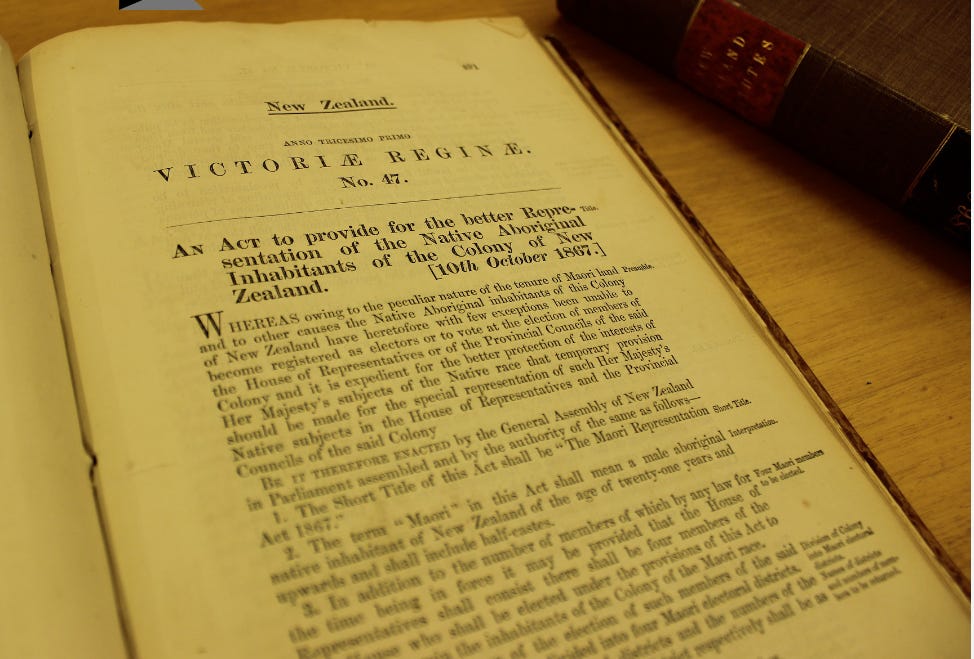
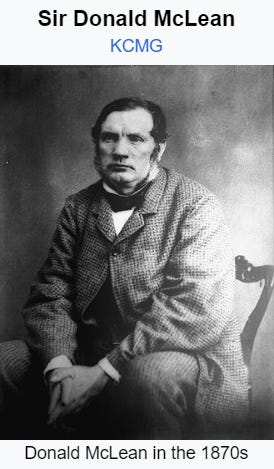
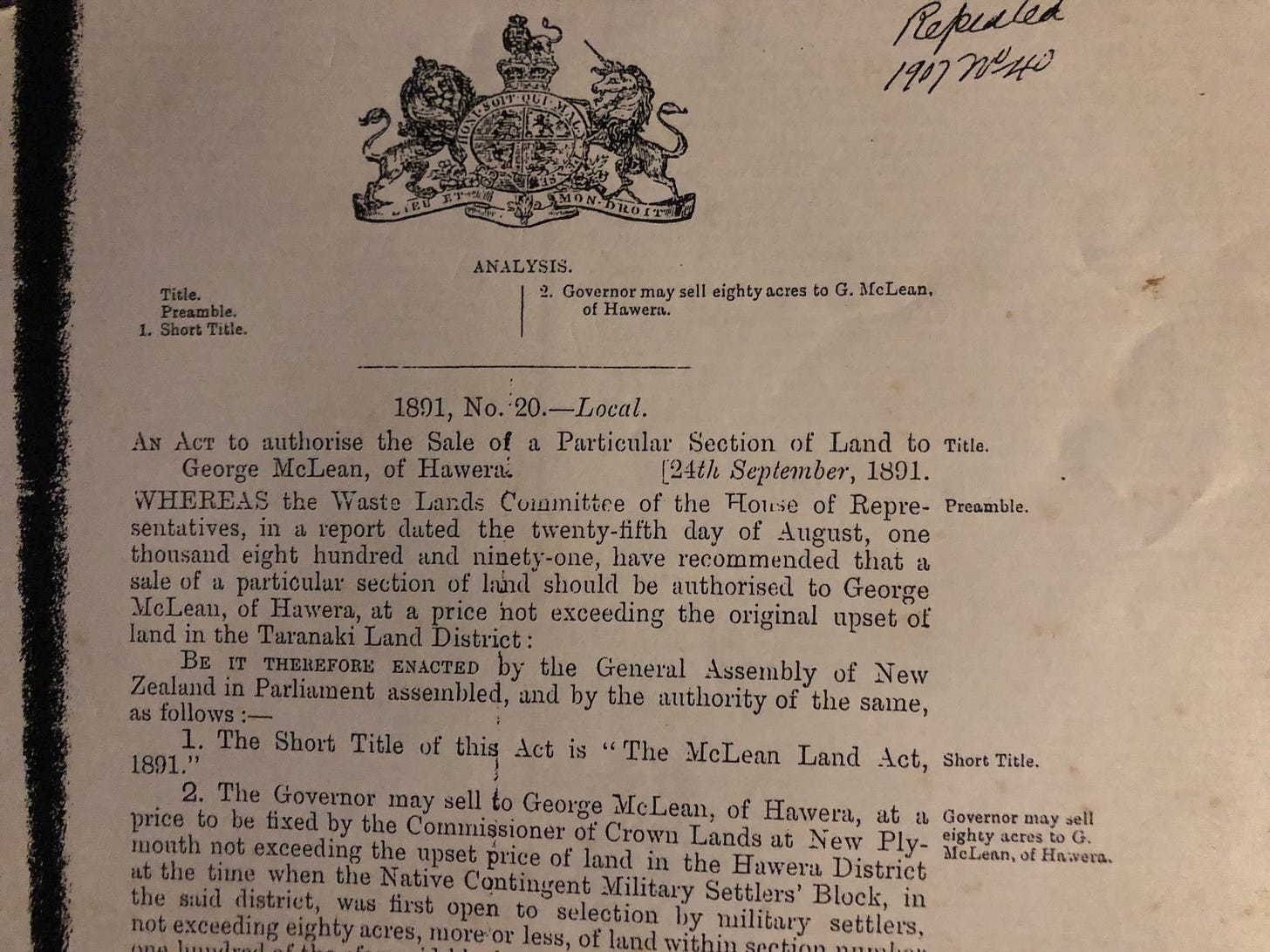
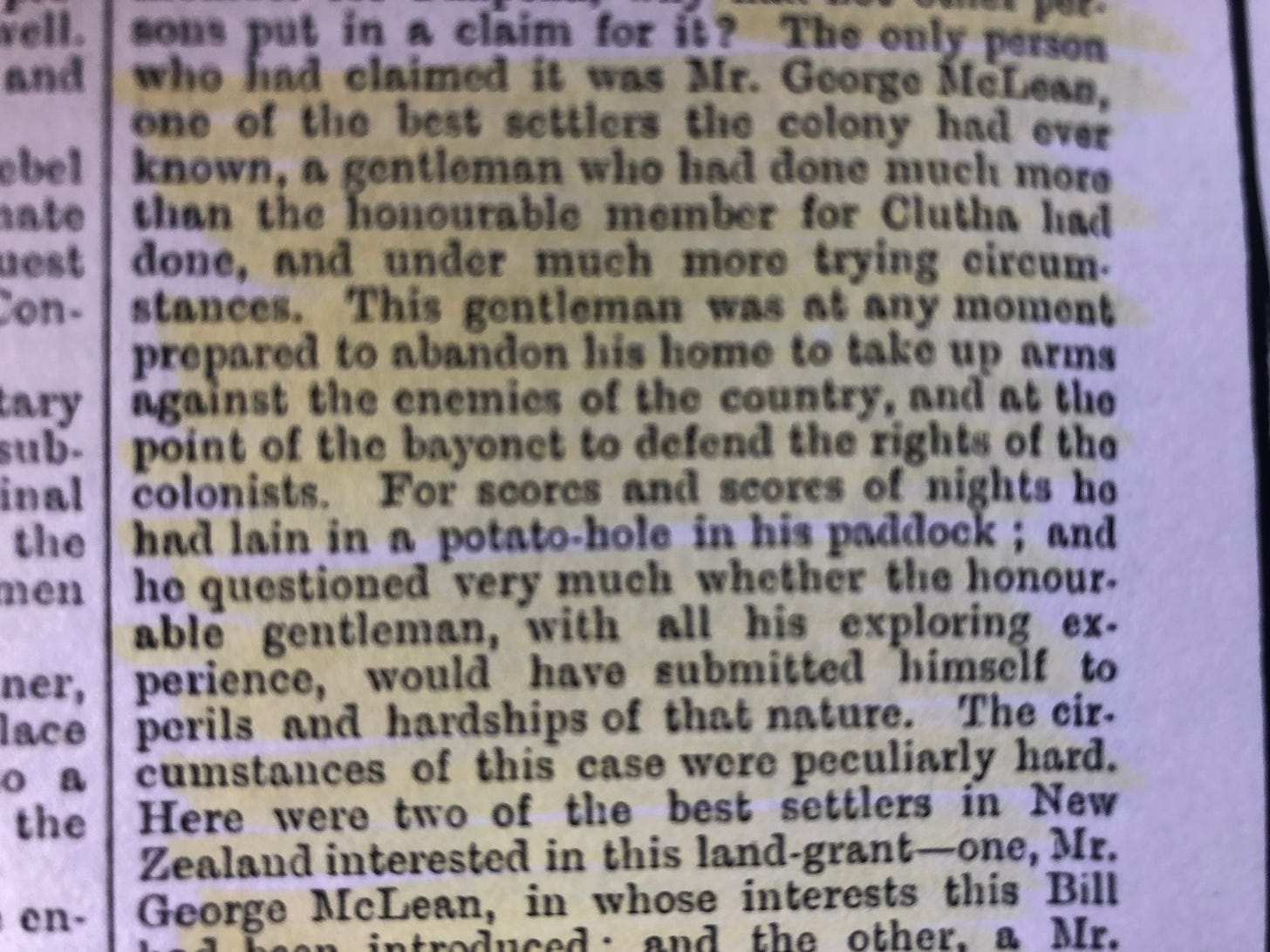
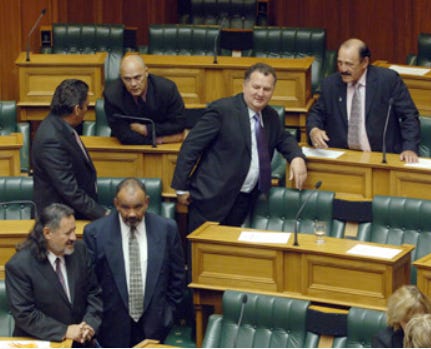
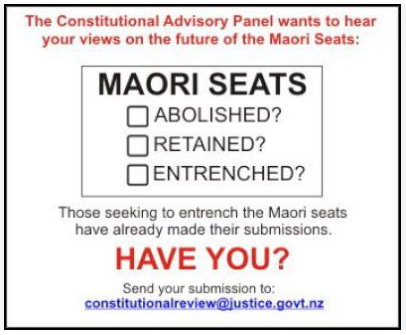
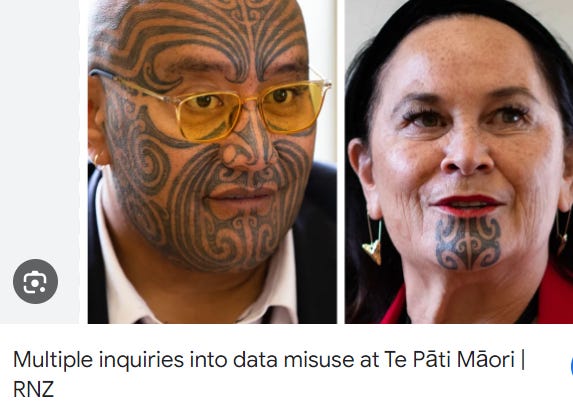
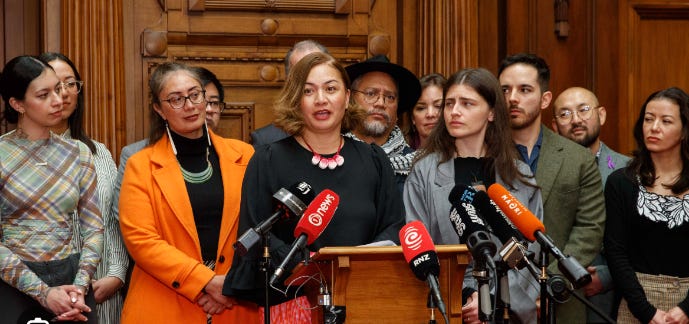
Thanks DC Harding, all feedback gratefully received! On your points 1) The current reality, for better of worse, is that Parliament could abolish the Maori Seats with a simple majority. I guess you may argue that such a drastic change ought to require a "super majority" (which is typically 75%) or a public referendum, and that's a defensible argument. I was just pointing out what the current Government would have to do if they wanted to abolish (I'm extremely doubtful they would) 2) I make no bones about my view that Te Pati Maori is predominantly currently composed of crazy anti-democratic divisive types, and clearly represent only a small minority of Maori. I do happen to think, on balance, that with MMP Maori seats have now done their dash. That's not racist view. Plenty of Maori would like to see those seats gone, including Peters and Jones. I agree Maori never, prior to colonisation, regarded themselves as a singular race (or nation). But neither is there a unitary "Maori world view". That's myth. People with Maori ancestry have all sorts of different views, including on their attitudes to traditional Maori cultural beliefs and practices. and Maori are free to adopt traditional Maori practices and language to whatever extent they like (a right guaranteed in Article 2 of the Treaty); indeed, that's officially encouraged. Maori seats aren't remotely necessary for that. And yes, Maori seats are democratic because they're currently a product of Parliament having passed laws. Are you Maori, btw?Cheers, John
I don't have time to really dig deep into how false your narrative above is, however, I will point out a couple of things. 1). If government wanted to change the electoral system in this country, including the removal of of the Māori Electoral Roll, they'd need to have a super majority of 70% of the house - not 50%. It is a fundamental constitutional change for this country.
2) Act, New Zealand First and others over the years, have used the "electorate vote" to get into Parliament. And yet, the way you write it, is it's only about Te Pāti Māori. You completely leave out that Labour has the 7th Māori Roll seat and skipped the entire history of New Zealand First taking all 5 of them a short time ago.
Your complete bias over the Māori seats is obvious. What you haven't done is developed an argument that would see Māori agree with you. You're using Māori solely as a race based argument, which is a pakeha construct. Māori don't see themselves as a "race" - Māori, as a whole, never did. It wasn't until Non-Māori got here, that Māori was a "construct". Māori are individual whanau, hapū and iwi - first. What your argument also doesn't acknowledge is the "why" they existed in the first place. Yes, it was decided that Māori representation was required - but you have said "why". It's in the "why" that is still relevant today. It is about the Māori worldview. IT isn't about race. It isn't about Māori people wanting to be separate, it isn't about ensuring that tikanga Māori is the only lore/law that is granted assent. It's about ensuring that the indigenous ways of being and knowing is at the table, as Māori have the right to live, breathe and be Māori. The Treaty of Waitangi never asked Māori to cede their ways of being and knowing or their ways of life.
Your argument is fundamentally flawed.
What I will congratulate you on is your stance on Māori seats being democratic. You're one of the few people, whose commentary I've read, acknowledges this.